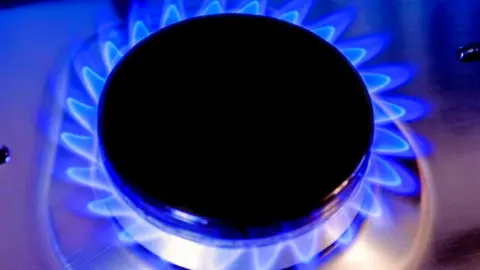Rising energy bills: 'Penny-pinching and duvets to keep warm'
 Sandy Birtles
Sandy BirtlesWhen she goes in to check on him at night, Sandy Birtles says she can hardly see her teenage son for all the layers on his bed.
The single mother of two says that the family do all they can to keep warm as the bills continue to rise.
"I do not have the heating on when the kids are at school," she said.
"If I'm not running around and clearing up, then I'm wrapping up in a coat."
She said that financial pressures mean she had been "penny-pinching all the time", but she said rising energy bills have added to the strain.
They have to be careful not to use too much hot water, she said, and when her 15-year-old son wanted to add to his bedding she got him a double duvet.
She is worried that these bills will continue to rise, and a charity has predicted that she - and millions of others - will face a particularly difficult bill shock early next year.
National Energy Action has predicted that when domestic energy prices rise in April, it will mean that the typical domestic gas bill will have doubled in 18 months.
The charity, which campaigns for warm, dry homes, used industry data and forecasts to predict that the typical gas bill, for those on standard tariffs, is likely to have gone up from £466 a year in October 2020, to £944 in April 2022.

Catherine Geddes, who lives on her own in Keighley, is also struggling to cover her energy costs and was worried about the likelihood of them continuing to rise sharply.
She has found unusual ways to try to keep the cost down.
"I very rarely put the heating on. Basically I wrap myself up in a blanket and I will use the hairdryer to warm me up.
"My anxiety levels are so high. It is just a nightmare."
Most households pay for their gas and electricity together in a dual-fuel deal. Those who pay a standard tariff are protected by the industry regulator Ofgem's price cap.
This was set at its lowest level in October 2020, owing to relatively low wholesale prices faced by suppliers.
It meant the typical annual domestic energy bill for millions of households was no higher than £1,042 a year.
However, it has increased twice since then, most recently its biggest increase to date this October, which meant those on standard tariffs, with typical household levels of energy use, saw an increase of £139 to £1,277 a year.
There is widespread expectation that owing to soaring wholesale gas prices in recent months the next price cap in April will be set at a much higher level than now.
'Budgetary knife-edge'
National Energy Action has predicted that this is likely to be a £550 a year increase for a typical standard tariff dual fuel customer.
"The cost of living in the UK is at its highest level in a decade with household energy bills the biggest driver. When the costs of essential services go up, those on lowest incomes get hit hardest," said Adam Scorer, the charity's chief executive.
"For people already on a budgetary knife-edge, the cost of keeping a family warm has exploded while budgets have collapsed. No amount of useful tips or savvy shopping can cope with that."
 Getty Images
Getty ImagesThe existence of the price cap has delayed the impact of surging wholesale prices on household bills.
However, it has also been blamed as creating an unmanageable market by some of the smaller energy firms which have collapsed during the current crisis.
Their customers have been moved onto tariffs with other suppliers, in line with the price cap.
As a result, hundreds of thousands of people who might have expected to be protected from price rises as they were on a fixed rate will now also be hit by the April price rise.
In October, Ofgem chief executive Jonathan Brearley told the BBC that the price cap was there to stop firms making unfair profits, but "legitimate costs have to be passed through".
He said it was too early to say how much the rise in April would be or whether Ofgem would have to review the price cap more frequently in future.
Energy UK, which represents the industry, has said that anyone who is struggling to pay for their energy bill should call their supplier for support.
"Suppliers have put forward more support for customers who might be struggling with their bills this year, and we are currently working with consumer groups to help raise awareness of the help that is available," said Emma Pinchbeck, Energy UK's chief executive.

Have you been affected by issues covered in this story? Share your experiences by emailing haveyoursay@bbc.co.uk.
Please include a contact number if you are willing to speak to a BBC journalist. You can also get in touch in the following ways:
- WhatsApp: +44 7756 165803
- Tweet: @BBC_HaveYourSay
- Upload pictures or video
- Please read our terms & conditions and privacy policy
If you are reading this page and can't see the form you will need to visit the mobile version of the BBC website to submit your question or comment or you can email us at HaveYourSay@bbc.co.uk. Please include your name, age and location with any submission.